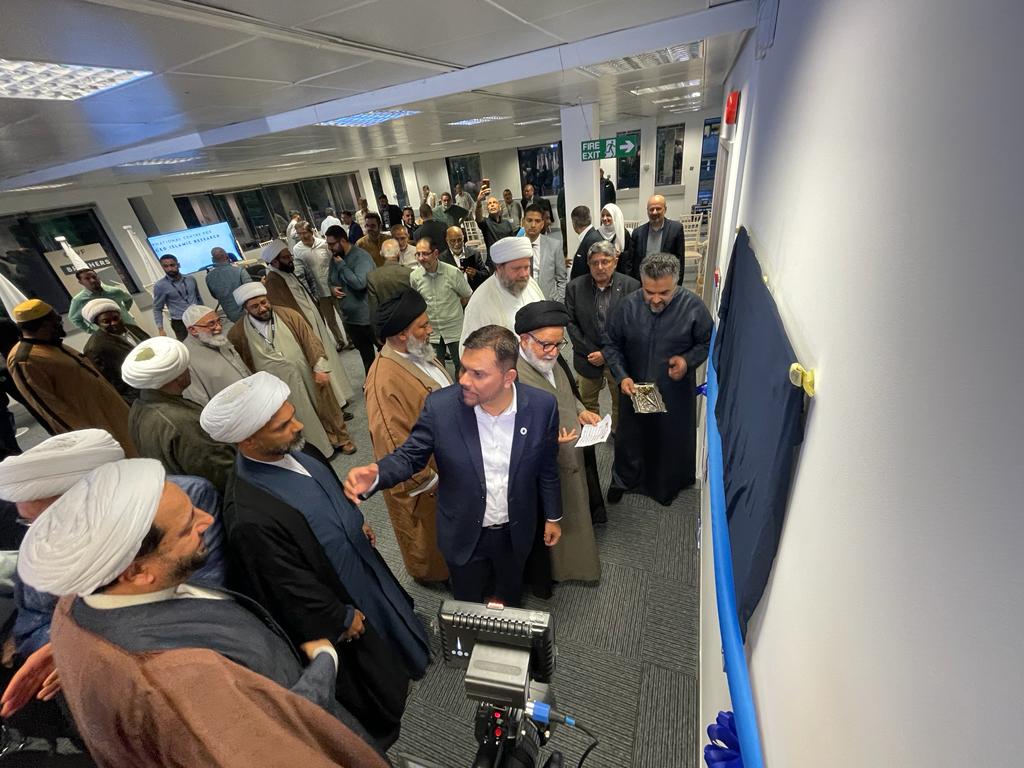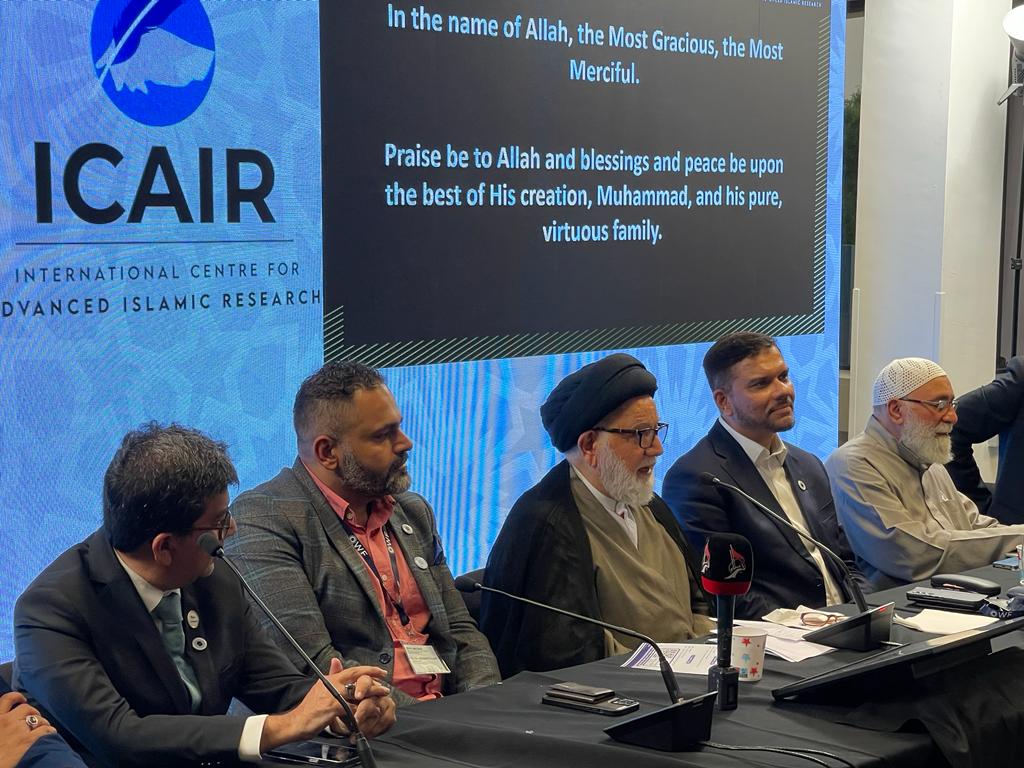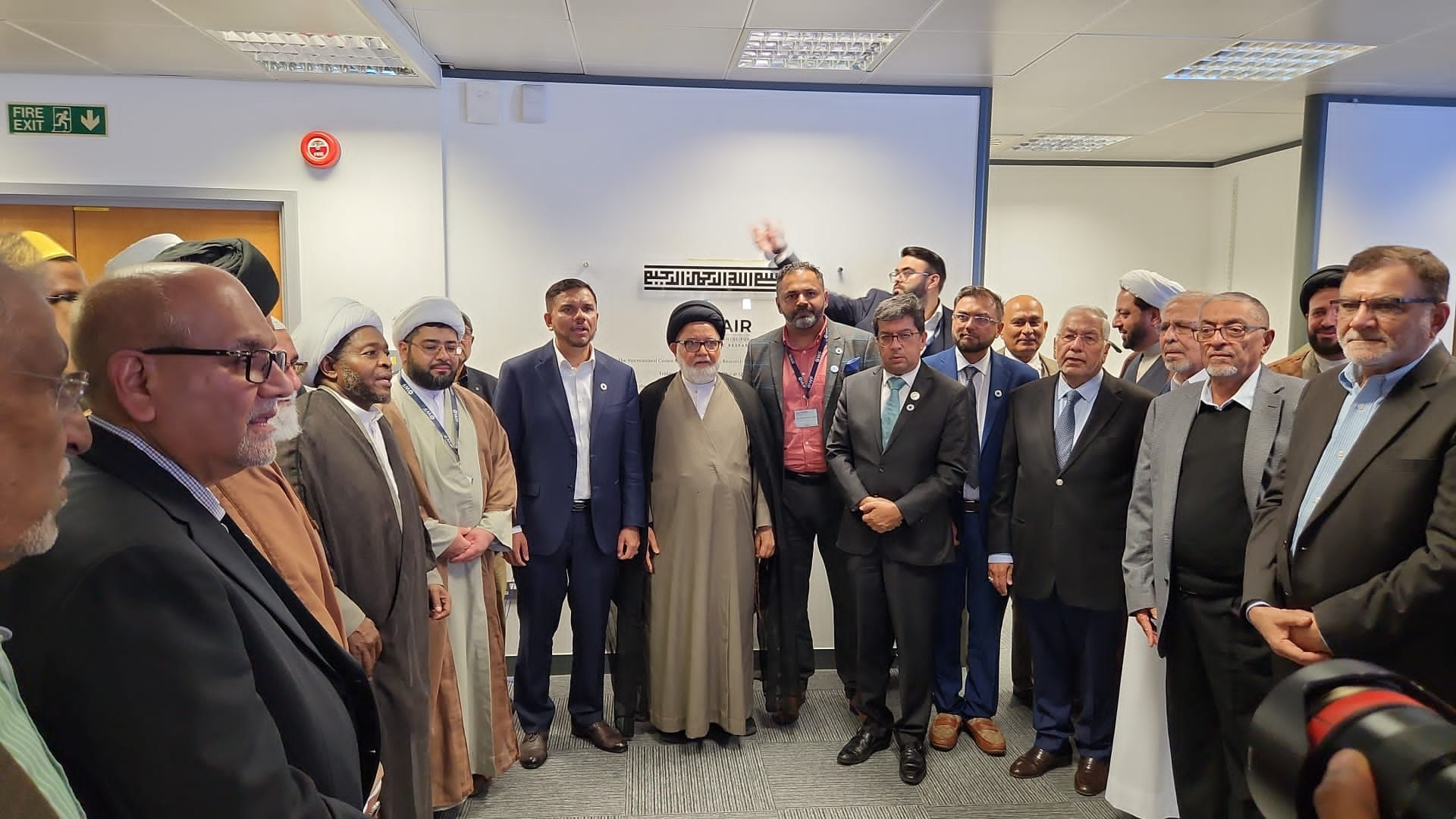Shawwal Moon Crescent 1446
In the Name of the Most High
Monday 31 March is the first day of blessed Eid Al-Fitr in Iraq, Middle East, United Kingdom, Scandinavian countries, Europe and most of the countries except Australia.
Eid prayer will be held at 10am in Dewan Al-Kafeel
120 Alperton Ln
Wembley HA0 1HD
Liaison office of Grand Ayatullah Sayyid Ali Al Sistani (L.M.H.L) in London, Europe, North and South America.
- Activities
- 20 Thul-Qida
The speech of His Eminence, the distinguished scholar Sayyid Murtada al-Kashmiri at the opening ceremony of the International Centre for Advanced Islamic Studies (ICAIR)
In the name of Allah, the Most Gracious, the Most Merciful.
Praise be to Allah and blessings and peace be upon the best of His creation, Muhammad, and his pure, virtuous family.
Ladies and gentlemen,
In the modern Islamic knowledge landscape, a crucial source of strength lies in its capacity to establish the pristine nature of the religion, ensuring the accuracy of its texts and literature while safeguarding them from errors and distortions. This ability is characterised by the utilisation of rational evidence and persuasive arguments, employing sophisticated scholarly methodologies to defend, scrutinise, and contemplate, all in order to protect the very foundations of this faith and counter any uncertainties. These teachings, faithfully transmitted from the revered Prophet and Imams of Ahl al-Bayt (a.s.), remain an authentic and untainted representation. However, there are pressing matters that urgently require attention, both within the broader field of research and specifically within this particular research centre. These are:
1. The creation of research centres stands as a significant endeavour that believers should actively pursue and invest in, akin to other acts of devotion and religious institutions like mosques, Husayniyyas, and centres for the propagation of Islam. Their importance should not be underestimated, as each element fulfils its unique role within the broader Islamic system, contributing to the dissemination of authentic religious teachings.
2. It has come to our attention that numerous hostile publications and misleading studies have originated from research centres established and financed by adversaries of the faith. These centres persist in disseminating their detrimental influence throughout our community, and regrettably, some young Muslims have fallen victim to their deception. They blindly accept the works published therein, venerating them as indisputable scientific truths. However, many of these publications lack the essential rigour and proper methodology required to address religious matters in general, and specifically, Islamic and Shi'i subjects. To counter these erroneous ideas, in addition to refuting and cautioning against them, it becomes imperative to establish purpose-driven research centres. These centres should be staffed by knowledgeable experts in religious matters, who can conduct comprehensive research and widely disseminate their findings.
3. It is essential for those overseeing these research centres, particularly the employees and researchers within them, to recognise that their work is not merely a routine occupation like any other. They are bound by a purpose defined by the Almighty in numerous verses of His Noble Book, such as ‘call to the path of their Lord…’ (16:125). Therefore, whether it involves writing an article, delivering a lecture, or exploring a topic, it is all part of the divine calling to propagate the way of Allah, a path illuminated by the Guiding Imams (a.s.). In this context, it holds little meaning for an individual to assert that their perspective or personal interpretation holds sway over a given matter. Rather, those working in these centres should adhere to the overarching path of the true sect, the followers of Ahl al-Bayt (a.s.), in accordance with the guidance provided by their religious authorities. Furthermore, it is not suitable to delve into contentious issues, ensuring that these research centres do not become a source of new disputes. It is incumbent upon the workers and writers within them to refrain from expressing personal opinions that contradict this prevailing course.
4. We are optimistic regarding the International Centre for Advanced Islamic Studies, as we believe it will serve as a significant and valuable addition to purposeful Islamic endeavours. Specifically, it is poised to enrich the Islamic and Shi'a landscape by offering profound studies that enhance the faith of believers, dispel uncertainties and suspicions, and establish the correct path upon a sturdy foundation of evidence and arguments.
Furthermore, it is crucial for those entrusted with the oversight of this centre to always bear in mind that the Quran has been the foremost scripture to address the issue of distortion in divine books such as the Torah and the Bible. Allah Almighty emphasises this in Surat al-Maida (5:13), stating, ‘Then, because of their breaking their covenant We cursed them and made their hearts hard: they pervert words from their meanings’ and in Surat al-Baqara (2:75), ‘Are you then eager that they should believe you, though a part of them would hear the word of Allah and then they would distort it after they had understood it, and they knew?’ In contrast, the Quran has been preserved from distortion because Allah has taken it upon Himself to safeguard it, not entrusting its preservation to humanity. Allah affirms this protection in Surat al-Hijr (15:9), ‘9 Indeed We have sent down the Reminder, and indeed We will preserve it.’
Nonetheless, distortion was indeed extended to the Prophet (s.a.w.) in the shape of slander, falsehoods, and the misattribution of traditions to him. This was explicitly acknowledged by the Commander of the Faithful (a.s.) when he stated:
‘The fabrication of traditions commenced during the time of the Prophet (s.a.w.).’
Researchers suggest that the prominent figures engaged in this practice during the Prophet's era included Abu Hurayra, Ka’b al-Ahbar, Ubayy ibn Ka'b, and others.
During the reign of the esteemed Commander of the Faithful [Imam Ali] (a.s.), Mu'awiya ibn Abi Sufyan actively fostered the growth of this deceptive practice, allocating vast sums of money from the treasury for this purpose. As an illustration, he reportedly offered Samura ibn Jundab 400,000 dirhams in return for falsely claiming that a particular verse (‘Among the people is he whose talk about worldly life impresses you’, 2:204) was revealed in reference to ‘Ali (a.s.), and that another verse (‘And among the people is he who sells his soul seeking the pleasure of Allah’, 2:207) was revealed concerning Ibn Muljam. Samura ibn Jundab accepted this offer and proceeded to address the people of Syria as a preacher, falsely asserting his role as a witness to these claims.
Thus, my esteemed audience, the succeeding Imams al-Baqir and al-Sadiq (a.s.) continued the work initiated by Imam al-Sajjad (a.s.) in exposing the fabrication and distortion of traditions, religious teachings, and theological doctrines, which had been kept hidden by the misguided rulers of the Umayyad and Abbasid caliphates. During this period, concepts such as predestination (jabr), delegation (tafwid), postponement of judgement (irja), corporealism (tajsim), and anthropomorphism (tashbih) gained prevalence. Extremist ideologies proliferated, heretical beliefs became widespread, and false traditions were fabricated in the names of these two Imams (a.s.).
The situation was so severe that Imam al-Baqir (a.s.) is reported to have said the following:
‘Do not accept any narration attributed to us unless it aligns with the Quran and the Sunna, or unless you find corroborating evidence from our previous narrations. Indeed, Mughira bin Sa'id—may Allah curse him!—inserted fabricated narrations into the books of my father's companions, which my father did not actually narrate. Therefore, fear Allah and do not accept from us anything that contradicts the words of our Lord, the Exalted, and the practices of our Prophet Mohammed (s.a.w.). When we narrate, we will say that Allah, the Mighty and Majestic, has said, or the Messenger of Allah (s.a.w.) has said…’
Imam al-Rida (a.s.) also described the manipulation of narrations concerning the Imams of the Ahl al-Bayt (a.s.) during that era, stating:
‘Our opponents have fabricated stories about our virtues and have made them of three types:
1. Exaggeration (ghuluw),
2. Underestimation of our status (taqsir), and
3. Explicitly highlighting the faults of our adversaries.’
Consequently, this centre, alongside other esteemed institutions, has assumed the responsibility of unveiling this obscured reality. By delving into the rich heritage of Ahl al-Bayt (a.s.) and purging it from any impurities, they aim to uphold the truth for all and invigorate the teachings of the Master of Messengers (s.a.w.). Therefore, we extend our heartfelt congratulations and offer our unwavering support in presenting these studies and scholarly undertakings. Such contributions prove invaluable to scholars, providing them with essential insights and introductory materials. This, in turn, equips jurists and academics with a comprehensive understanding of the subjects at hand, lightening their burden and facilitating their scholarly pursuits.
Following this evaluation, we would like to bring to your attention that in this era, which is marked by the imminent emergence of artificial intelligence with its associated risks and perils in various domains such as religion, life, technology, politics, art, education, questionable relationships, deviance, family, and social dynamics, you may find yourself facing competitors even in matters pertaining to religion, ideology, and research. Merely signalling a request can prompt the generation of a formidable model that can present a daunting perspective, whether positive or negative, and serve as a significant resource for those seeking guidance. Consequently, your work must assume a highly specialised character, marked by meticulous research and thorough investigation. It is essential to delve into the realm of research and inquiry with the primary objective of safeguarding the heritage of the true religion.
I ask Allah to help those entrusted with the administration of this institution, as well as the dedicated individuals who contribute their efforts, labour, and resources. May Allah safeguard and protect each and every one of you.
‘And say, “Go on working: Allah will see your conduct, and His Messenger and the faithful…”’














